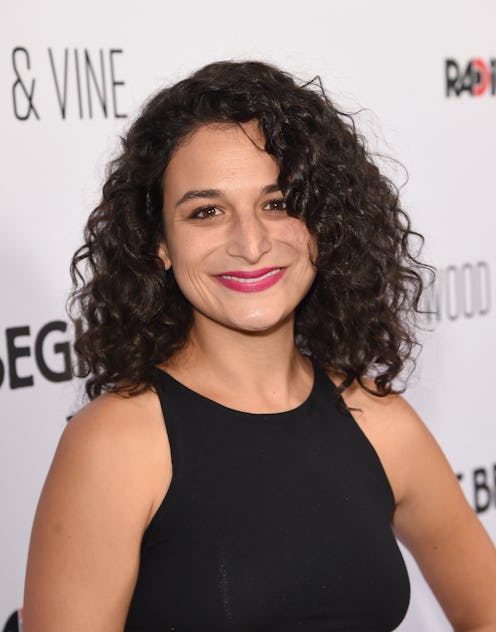Entertainment
Jenny Slate Hates "Oppressive" Bachelor Parties
She's a woman who isn't afraid to talk openly about sex, gender inequality, and the plight of sex workers — all while making audiences laugh. Jenny Slate appears in the Sundance Film Festival movie Joshy, about a group of guys who spend a bachelor weekend in Ojai, California. But when it comes to real life bachelor and bachelorette parties, the Obvious Child star avoids the pre-marital tradition. "I don't think the bachelor and bachelorette party in its traditional form has any place in the world I want to live in. Bachelor parties are gross, aggressive, and oppressive ceremonies that are a luxury of the patriarchy," she argues.
In the film, Adam Pally's Ari falls for Slate's Jodi over the course of his boys' weekend. The bachelor party the film portrays includes all of the naughty trimmings: drugs, alcohol, strippers, and a prostitute. "They are disgusting. They are offensive. They make me feel really sad and bad," the 33-year-old says of the pre-marital celebrations. "I also think that, at least in my own partnership, if I were kick off my life commitment to my husband by having one last gas, that would really set a bizarre tone for what our partnership would be. I think a good partnership is all about sexual exploration and emotional openness, and if for some reason you think it's going to go away after you partner, that's a really sad world to live in."
One of the "disgusting" (and often illegal) traditions of bachelor parties include hired sex workers — a final hurrah before a supposed life full of fidelity. "What's gross to me is men being comfortable and amped up about there being a marketplace where they can purchase a woman's body," Slate says. "I'm sure there are many empowered sex workers, who are happy to do it, but it seems to me that in a lot of these situations the women that are being hired to come to take their clothes off are not doing it as anything but a last resort. Maybe I'm totally wrong, and I shouldn't put it on women. It's not why the women are doing it, it's that the men feel that it's a luxury that if they can afford it they are allowed to purchase it."
She continues to say, "What also bums me out is let's say I changed my mind, and all of a sudden I decided I wanted to do sex work, and I felt empowered by that, I shouldn't have to feel shame for it. The thing to feel shame about is objectifying anybody, and dehumanizing anyone, regardless of their gender."
Another problem Slate has with the traditional, men-only bachelor party is the no-girls-allowed vibe. "What makes me feel upset is the gender segregation. While there is a beautiful, secret, witchy world of women that I feel with my female friends, if a man that I know wanted to be included in that, I wouldn't say he couldn't join us. And I don't think that's a feminist thing to say that a man who wants to join in can't join in, if it's essentially about equality."
Slate married director Dean Fleischer-Camp in 2012, and for her own bachelorette party, she decided to do things a little differently. "I didn't have a bachelorette party, but I went away to Ojai and had a weekend smoking pot and talking about being women with my sisters and my best friend who was also getting married," she says, noting that her celebratory weekend was fortuitously in the same location she shot Joshy three years later.
"I had been so stoned the weekend away with my friends that when we got their to shoot Joshy I was like, 'I've been here before!' but I couldn't put my finger on it. But it wasn't a bachelorette party, it was just sort of a gift to help me relax. Because planning a wedding is stressful."
Joshy premiered at Sundance film festival on Sunday, and has yet to receive distribution.
